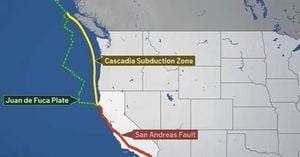Britain is bracing for another bout of extreme summer weather as a yellow heat health alert has been issued for large swathes of the country, with forecasters predicting temperatures soaring above 30°C (86°F) early next week. The UK Health Security Agency (UKHSA) sounded the warning on August 8, 2025, setting the alert in place from midday Monday, August 11, until 6pm on Wednesday, August 13. The affected regions include Yorkshire and the Humber, the East Midlands, the East of England, London, the South East, and the South West, covering nearly all of England except the north-east and north-west, according to BBC and The Independent.
For many, the news comes as both a welcome return of sunshine and a cause for concern. The UKHSA’s yellow alert means significant impacts are possible across health and social care services due to the high temperatures, a point echoed by The Independent, which cautioned over “significant impacts” for vulnerable groups and the NHS. This heatwave marks the fourth of the summer, following previous spells of intense warmth in June and July, as confirmed by Sky News and BBC.
The science behind the swelter is a complex dance of meteorological forces. According to BBC, warm air will be drawn up from the south, thanks to an area of high pressure drifting across the southern UK, combined with the remnants of Tropical Storm Dexter swirling in the Atlantic. Met Office Deputy Chief Meteorologist Steven Keates told The Independent, “We’re confident that temperatures will increase markedly by the start of next week, reaching the low 30s Celsius in parts of England on Monday and perhaps the mid 30s in a few places on Tuesday. However, the length of this warm spell is still uncertain, and it is possible that high temperatures could persist further into next week, particularly in the south.”
After a turbulent week marked by Storm Floris, which battered Scotland and Northern Ireland with heavy rain and high winds, the weather is poised for a dramatic turnaround. BBC notes that the weekend will begin on a mixed note, with a weather front bringing rain and strong winds to Scotland and Northern Ireland on Saturday, August 9. However, as the front weakens and high pressure builds from the south, most of England and Wales will bask in spells of warm sunshine and a few scattered showers. By Sunday, August 10, temperatures are expected to reach 26-28°C (79-82°F) in central and south-eastern England, setting the stage for even higher readings as the week begins.
Monday and Tuesday, August 11 and 12, are shaping up to be the hottest days, with central, southern, and eastern England likely to see temperatures between 27-31°C (81-88°F), and some spots possibly peaking at 32-33°C (90-92°F), according to BBC’s forecast. Sky News adds that temperatures could even reach about 33°C (91°F) on Tuesday, especially across central and southern England. The Met Office, cited by The Independent, is not ruling out the possibility that some locations might experience the mid-30s, depending on cloud cover and the movement of thunderstorms expected to drift up from the south.
It’s not just the daytime heat that will test the resilience of residents. Warm and stuffy nights are expected from Monday night onwards, with overnight temperatures rising and making sleep uncomfortable for many. Kirsty McCabe, Sky weather producer, explained, “High pressure will extend from the Azores, allowing temperatures to rise, especially in the South where heatwave criteria is likely to be met early next week. Overnight temperatures will also rise, leading to some warm and stuffy nights from Monday night onwards.”
The official definition of a heatwave in the UK is when a location records at least three consecutive days with daily maximum temperatures meeting or exceeding the heatwave threshold, which varies from 25°C in Scotland to 28°C in London. The hottest day of the year so far was July 1, when St James’s Park in central London recorded a blistering 34.7°C (94°F), as reported by Sky News.
While southern and central England prepare for sweltering conditions, northern parts of the UK, including Scotland and Northern Ireland, can expect a different story. These regions will see cooler, wetter weather, with highs of 16°C (61°F) in northern Scotland over the weekend, rising to 23-25°C (73-77°F) at best during the peak of the heatwave, according to BBC. The wet and windy conditions that have plagued the north are expected to clear somewhat next week, bringing some relief and warmer weather, if not the full brunt of the heatwave.
Elsewhere in Europe, the Middle East, and North Africa, heatwave conditions are also forecast, with temperatures reaching the low to mid-40s Celsius in Spain and Portugal, and overnight lows staying above 20°C (68°F). France may see temperatures climb above 40°C (104°F) on Sunday and Monday, while the Netherlands and Germany could experience mid-30s next week, Sky News reports.
But the UK’s heatwave won’t last forever. By the end of next week, BBC predicts that winds from the south will be replaced by cooler Atlantic air, bringing generally lower temperatures. However, warmth is likely to linger across southern and eastern parts of the UK for a while, and long-range forecasts suggest further spells of very warm or hot weather are possible during August, especially in the south and east.
Amid the heat, there’s a rare treat for sky-watchers: the Northern Lights may be visible in the north of the UK on the night of August 8, following a coronal mass ejection from the sun, according to Sky News. Cloud cover may make viewing tricky, but the spectacle could cap off a week of remarkable weather contrasts.
With the yellow heat health alert in effect, authorities urge the public—especially the elderly, young children, and those with health conditions—to take precautions. Health services are preparing for increased demand, and officials are reminding everyone to stay hydrated, avoid strenuous activity during the hottest parts of the day, and check in on vulnerable neighbors and relatives.
As Britain readies itself for another round of record-breaking temperatures, the nation’s resilience and adaptability will once again be put to the test. With the possibility of more heatwaves on the horizon, this summer is shaping up to be one for the history books.





